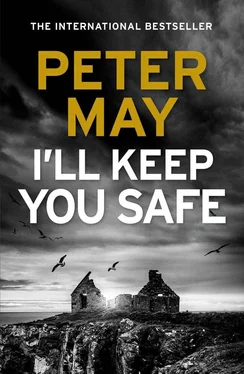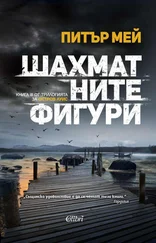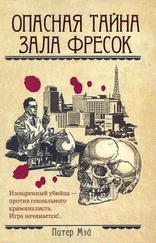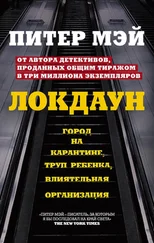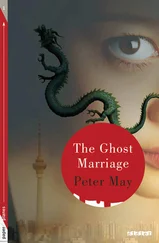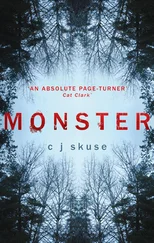And then the phone rang. A series of single, penetrating trills that dragged her, reluctantly, back to reality. She checked the time. It was almost midday. Which day? For a moment she was lost in confusion about the passage of days and time. Donald was coming. Was that him already? She focused. No, Donald was coming tomorrow. She rolled over and swung her legs down to the floor, sweeping her hair back out of her eyes and lifting the receiver.
‘Yes?’
‘Bonjour Madame. This is Aurélie in reception. I’m sorry for disturbing you. There is someone here to see you.’
Niamh wondered who that could possibly be. The police? ‘Who?’
‘A Monsieur Blunt.’
Blunt’s name struck Niamh like a slap in the face. Neither she nor Ruairidh had seen Lee since the falling-out. Cut out of his life as if they had never existed. While he had gone on from celebrity to superstardom. The great young guru of British fashion, who had both made and very nearly destroyed Ranish Tweed.
She stood up, her mind filled with confusion, and caught sight of herself in the mirror. She needed to get out of these clothes, to shower. She said, ‘Tell him to give me fifteen minutes then send him up to the room.’
Our first meeting with Lee Blunt came early in our stewardship of Ranish Tweed, and it changed our lives.
We had hoped, when we first bought the company, that Richard Faulkner would continue to weave for us, at least until we managed to get ourselves on our feet.
Along with the business we had bought his order book, which would be enough to see us over the first few months while we sorted through the shambles that was his design archive, and got our two fathers up and running to weave Ranish on their own looms. Not to mention the training of Ruairidh to weave himself, which his father was going to do. Ruairidh had also signed himself up at Lews Castle College in Stornoway for day courses in business-management skills for people new to self-employment.
It was chaos in the beginning, and I was dispatched to go over to Ranish to sweet-talk old man Faulkner into seeing us through the transition.
He was very subdued when I phoned to ask if it was convenient for me to call in and see him. ‘Come tomorrow,’ he said. ‘About two.’
It was July, and we had just completed the complex business of drawing up and signing contracts, making sure there were no loopholes or tripwires before transferring the money from Ruairidh’s redundancy account to make Ranish finally ours. After a miserable dull and damp June, bedevilled by midges and cleggs, the weather had finally turned, and it was a beautiful summer’s afternoon when I drove over the moor to Ranish. A brisk breeze from the west sent what few clouds there were scudding on their way and kept the midges at bay. Unlike that first drive across the island with Ruairidh to see the old man, the moor to the south was green and lush. All those tiny scraps of loch reflected sunlight in shiny fragments, like so many pieces of silver paper strewn across the land. And the mountains of Uig and Harris stood in sharp outline against a crystal-clear sky.
Ranish itself was bathed in sunshine, shrubs and the odd rowan in leaf and flower in these more sheltered east-coast bays. The sea was impossibly blue, coruscating out into the Minch, and peppered by all those tiny basking islands in the mouth of Loch Erisort. The Barkin Isles, Tabhaidh Bheag, Tabhaidh Mhór. And it felt like you could almost reach out and touch the Isle of Skye.
I parked at the road end and made my way down the crooked steps Faulkner had set into the hillside in some distant past. There was no sound of flying shuttles emanating from his shed, and I was drawn towards the house by the barking of his dog. The Land Rover was parked out front where it usually stood, and Tam was tied on a long leash to a ring set in stone to one side of the front door.
He seemed inordinately pleased to see me, barking and leaping around my legs. We had got to know one another quite well during the months of negotiation and to-ing and fro-ing. I knelt down and clapped his head and ruffled his ears. ‘Good boy! Where’s your daddy? Is he in the house?’ Which seemed to get him even more excited.
I knocked on the front door and went inside. Despite the warm summer’s day on the outside, it was cold in here, and still smelled of damp and wet dog hair.
‘Mr Faulkner?’ I called out. ‘Hello, are you there?’ A resounding silence was the only response. I went into the kitchen. A mug of tea stood on the worktop by the sink. Barely touched and stone cold. I brushed my fingers against the kettle. It was cold, too. I went back out into the sitting room and called again. Still nothing. And all the while Tam was barking and barking outside.
I went out again, blinking into the sunshine, and followed the wall around to the back of the house and the long stone outbuilding with its green-painted tin roof where old man Faulkner did his weaving.
There was some sixth sense by now telling me that all was not well. And it was with considerable apprehension that I pushed open the old wooden door. I can remember the sound of it to this day. Wood and hinges groaning in the half-light that crept in through tiny windows along the back wall where the hillside blocked out the sunlight.
I didn’t understand at first what it was that I was seeing. Something dark and heavy draped from the rafters along with all the loops of yarn and bolts of tweed that stood leaning up against them. But with the breeze that followed me in through the open door, the hanging shape revolved a half-turn, and I saw the light catch the old man’s profile. His eyes were open, his mouth gaping, head tilted at an unnatural angle, resting against the rope that stretched under tension from the beam above him to the loop of it around his neck. An old wooden chair lay on its side on the floor where he had kicked it away to let his own weight squeeze the life out of him.
I suppose I might have screamed had my voice not deserted me. I could still hear Tam barking, and the sound of the sea breaking gently all along the ragged coast, like the sound of the breath that had long left old man Faulkner. And I was remarkably calm.
His lifeless form held my gaze for several long moments, before my eyes flickered down to the folded sheet of white paper lying on the warp threads of his loom. I moved carefully across the shed, not wanting to make a sound. Somehow death demanded your silence. As if by showing it respect you might one day avoid it yourself. Though only the deluded might believe that.
I lifted and unfolded the note he had left on the unfinished weave and recognized his big, untidy hand.
My dearest Niamh,
Please accept my apologies for inflicting this upon you. But I might not have been found for weeks, and poor Tam would have starved to death. I know you will find him a good home. I live on with you and Ruairidh in Ranish, and I wish you all success. But I could not bear to be parted from Isabella any longer.
Yours,
Richard
The weeks that followed were difficult. It was as if a part of Ranish Tweed had died with its creator, and it was all that we could do to breathe life back into it.
Ruairidh spent days and days with his father, learning the arcane skills of the weaver. There were courses in how to work a loom, but they were mostly now for the Bonas-Griffith double-width loom that nearly all Harris Tweed was being woven on. And we were determined to maintain the uniqueness of Ranish by sticking with the single-width.
Tam found his new home with me and Ruairidh in the half-restored old whitehouse on the Macfarlane croft, and there was something reassuring in his presence. Almost as if he were keeping a watching eye over us on behalf of his master. I’m sure he missed him, but I think he also took comfort from the sound of the Hattersley in Mr Macfarlane’s loom shed. He found himself a spot there to curl up and sleep while Mr Macfarlane taught his son how to weave.
Читать дальше
